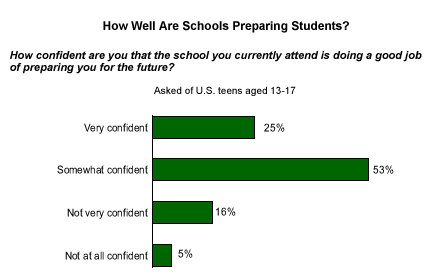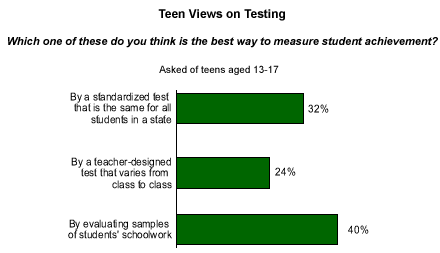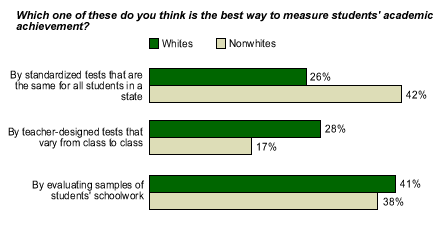Last week, the Bush administration, in response to complaints about the strict requirements imposed by its No Child Left Behind (NCLB) education law, made it easier for teachers in rural areas, science teachers, and teachers who teach multiple subjects to demonstrate that they are "highly qualified." The concession touched off a fresh round of debate about the controversial law, which has already become a significant point of contention between President George Bush and likely Democratic challenger John Kerry.
Amid the commotion generated by politicians and lobbyists over this issue, the voices of students themselves are rarely heard. But a new Â鶹´«Ã½AV Youth Survey* asked American teenagers a few questions central to the debate about NCLB -- including whether they feel their schools are adequately preparing them for the future, and what they think is the most appropriate way to gauge that level of preparation.
How Are Schools Doing?
Teens aged 13 to 17 were asked, "How confident are you that the school you currently attend is doing a good job of preparing you for the future?" More than three in four teens (78%) expressed some degree of confidence in their school, although just one in four (25%) said they are "very confident" (53% are "somewhat confident," while 21% are "not very" or "not at all" confident).

Teens' likelihood to express confidence that their school is preparing them for the future seems to erode somewhat as they grow closer to that future: 82% of teens between the ages of 13 and 15 are very or somewhat confident, compared with 72% of 16- and 17-year-olds.
Despite concern that minority and low-income students disproportionately attend schools with inadequate resources, nonwhite teens are at least as likely as white teens to feel confident that they're being adequately prepared for the future -- 83% of nonwhite teens expressed confidence vs. 75% of white teens.
This finding may seem counterintuitive, but it does jibe with a study led by Mihaly Csikszentmihalyi and Barbara Schneider of the University of Chicago in the 1990s, which found that "Caucasian students report significantly lower levels of optimal experiences while at school than do other racial groups, and they experience less enjoyment during class activities. They also find school activities less desirable and important to their future goals."** The authors note that students who have a clearer sense of the education and training they need to reach their career goals have a more favorable view of academic activities in general. It may be that students in adverse social circumstances are more likely to be upbeat about their education, in part because they're more future-focused.
How Should Teens Be Evaluated?
Perhaps the biggest concern generated by NCLB is the pressure it places on schools, teachers, and students to perform well on annual standardized tests. NCLB opponents argue that teachers are forced to "teach to the test," excluding all other material they feel is important. Another argument is that the tests themselves are often biased and inappropriate measures of student achievement.
Â鶹´«Ã½AV gave teens three choices -- standardized tests, individualized teacher-designed tests, or teachers evaluating schoolwork samples -- and asked which they feel is the best way to measure student academic achievement. There is no clear preference -- the plurality (40%) of teens say evaluating schoolwork is the best way to measure their achievement, but 32% choose standardized tests, and 24% teacher-designed tests.

Again, the responses of minority students are somewhat surprising. Despite well-publicized concerns that standardized tests may be inherently ethnocentric, nonwhite students are actually more likely than white students to choose standardized tests, by a margin of 42% vs. 26%.

Bottom Line
Education reform is one of the most complex domestic policy issues facing the U.S. government. There will be no easy answers to the problems facing public schools, especially if, as often happens in a highly politicized environment, public debate about those problems becomes oversimplified and agenda-driven. One group that deserves more input is the students. As Â鶹´«Ã½AV's results illustrate, their perceptions of the education process in which they are immersed are not as predictable as one might expect.
*The Â鶹´«Ã½AV Youth Survey is conducted via an Internet methodology provided by Knowledge Networks, using an online research panel that is designed to be representative of the entire U.S. population. The current questionnaire was completed by 785 respondents, aged 13 to 17, between Jan. 22 and March 9, 2004. For results based on the total sample, one can say with 95% confidence that the maximum margin of sampling error is ±4 percentage points.
**Becoming Adult: How Teenagers Prepare for the World of Work, Mihaly Csikszentmihalyi and Barbara Schneider, HarperCollins, April 2001